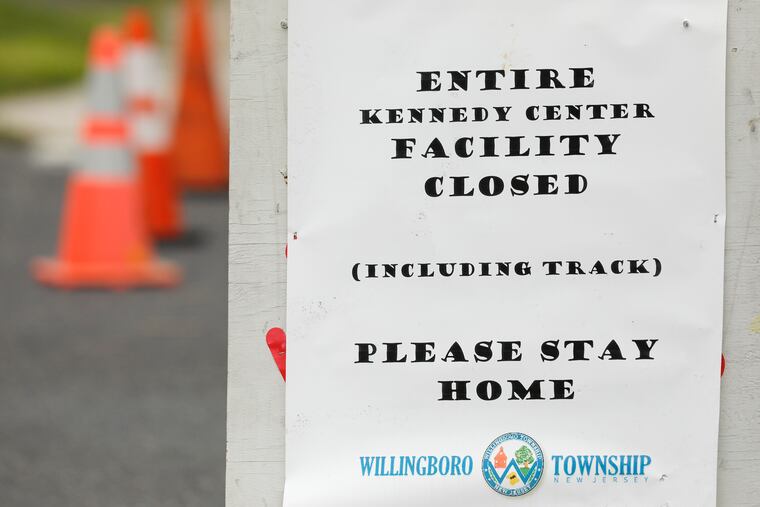In Willingboro, a worrying surge in coronavirus cases has officials looking for answers
With a population of seniors and veterans, commuters and African Americans, Willingboro's recent surge in coronavirus cases is sounding alarm bells.

It is a township filled with veterans and seniors, with a predominantly African American population. Its residents go to work in New York City, leaving via a bus stop at the town center, and to nearby Philadelphia.
Along the Route 130 corridor, vast distribution centers remain open.
Now, that unassuming place, Willingboro, population 31,887, is seeing an alarming spike in coronavirus cases that has officials worried and searching for answers, even as they work to head off what they fear will be a burgeoning hot spot in this Burlington County bedroom community.
“I’m concerned about the trends I’m seeing," said U.S. Rep. Andy Kim, whose district office is in Willingboro, in the same complex as the town’s senior center.
“It worries me," he said in an interview Sunday. "Willingboro has a large senior community and a large veteran community, which would be very vulnerable to this. I worry for them.”
Confirmed coronavirus cases in Willingboro, as reported by Burlington County, have grown from 58 on April 3 to 110 on April 6 to 184 as of Saturday. On Sunday night, Burlington County said there were now 193 cases in Willingboro.
There have been five deaths: two men, ages 58 and 79, and three women, ages, 59, 65 and 68.
At a rate of 57.7 cases per 10,000 population, Willingboro outpaces every municipality in South Jersey, according to an Inquirer analysis of numbers through Saturday. And that rate is behind only Ambler and Springfield in Montgomery County in a comparison of municipalities with more than 5,000 residents in the entire Philadelphia region.
Kim said that surge is being felt by those on the ground. “I’ve talked to a physician in the area who says without a doubt they’ve seen a surge in recent days in numbers in our areas," Kim said.
He’s also worried about Burlington Township, which had 96 cases as of Saturday, for a rate of 42.6 cases per 10,000 population. The more affluent Moorestown, with a population of 20,355, had reported 58 cases by Saturday, for a rate of 28.5 per 10,000 population.
Willingboro Mayor Tiffani A. Worthy said she has continued to stress social distancing in her township, as well as steps to help with economic distress. She said that police have stepped up their presence on the streets, and that she herself has called the police to report the beginnings of a gathering.
Worthy, a combat veteran who teaches project management at Drexel University, sees several contributing factors in her town’s coronavirus surge. She cautions that the data set is still small and could therefore present an incomplete or misleading picture.
In addition to Willingboro’s seniors, many retired veterans who have settled in an area that is near the Joint Base McGuire-Dix-Lakehurst, Worthy said the township is home to many who continue to work during the shutdown.
“We have a large contingency of people in Willingboro who work as essential workers, and are on the front lines of COVID-19,” Worthy said in a telephone interview Sunday.
She said many have been faced with the decision to risk exposure in order to provide for their family.
In addition to Virtua Hospital in Willingboro, Amazon has a one million-square-foot fulfillment center on the border of Burlington City and Burlington Township that employs upward of 600 people.
The township is also home to commuters to both New York City, a current focus of coronavirus cases, and Philadelphia, which by one White House measure could be the next hot spot. Its population in the 2010 census was about two-thirds African American, a demographic that has been disproportionately impacted by coronavirus in many places.
“It’s a bedroom community,” Worthy said. “People are going outside the community. There are people who work in New York City, they’re going back and forth to New York. They catch the commuter buses straight from Willingboro." .”
Kim, who appeared with Gov. Phil Murphy last week to call on FEMA to bring a testing site to South Jersey, said he was alarmed at the proximity of Willingboro and Burlington Township, which also showed higher levels of cases, to both Philadelphia and New York City.
There is a county-run testing site in Westampton, by appointment only.
“This just is exactly the reason I’ve been pushing for more testing, to have a third FEMA site,” Kim said. “We need to get ahead of this."
He is also pushing for more personal protective equipment for local hospitals.
Kim said he was concerned with all of the county’s townships that are closest to Philadelphia.
“It’s the townships closest to Philadelphia,” he said. "The part of Burlington County closest to Philadelphia accounts for the bulk of positive tests so far that we see in the county.”
“We need more testing,” he said. “As we do more tests we’ll see the numbers pick up. It helps us to have a sense of where the spread is and where we have to put resources.”
He said places such as Willingboro, with senior communities and long term care facilities, “These are the types of places that could be disastrous.”
“We need a lot of resources to stay ahead of it and protect those most vulnerable,” Kim said. “We don’t want to see what happened in the New York metropolitan area happen here. [The numbers] definitely are warning bells.”
“This is something we’ve been concerned about for a number of weeks," Kim said. "We are literally on the outer edge of the biggest coronavirus hot spot in the world, New York City. And now right next door to what the White House is saying is the next hot spot [Philadelphia].
“That puts us right in the line of fire,” he said. “We should learn our lessons and do it better.”